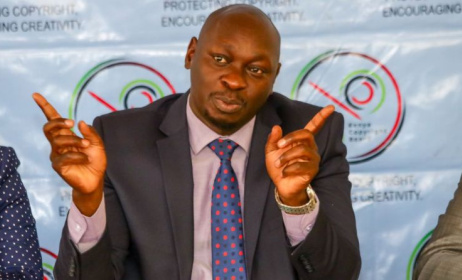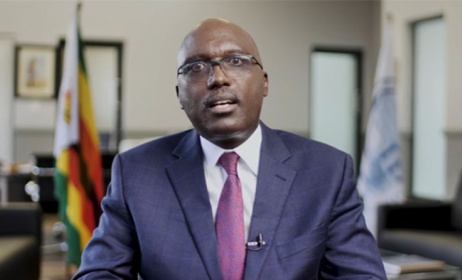Copyrights, royalties and music piracy in Kenya
The copyright industries in Kenya, according to the World Intellectual Property Organisation (WIPO) contribute close to 5.32% translating to Kshs.85.21billion ($75,377,063, 382) to Kenya’s GDP. More than five years since it was delinked from the State Law Office and became a fully-fledged State Agency, the Kenya Copyright Board (KECOBO) has been instrumental in new developments in the area of intellectual property in Kenya. This text provides an overview of copyrights, royalties and music piracy in Kenya, particularly recent developments in terms of legislation and court cases.
 MCSK awarding royalties to artists. Photo: www.cipitblog.wordpress.com
MCSK awarding royalties to artists. Photo: www.cipitblog.wordpress.com
Kenya has in the first half of year 2015, witnessed several critical developments in the area of copyright and related rights in Kenya. The Copyright Act[i], amended in November 2014, came into full effect in 2015 with a number of significant changes affecting royalties in Kenya’s music industry. In addition, the new Copyright Regulations[ii] of 2015 provides the national copyright office; KECOBO with a considerable financial boost to fight piracy and other related copyright offences. Finally, there have been a number of notable court cases filed and decided in the area of copyright law.
Copyrights
The newly amended Section 28(5) of the Act lays the foundation for musicians and music producers to receive royalties under the blank tape levy system[iii]. The private copying levy[iv] or blank tape levy is a levy payable to copyright owners by manufacturers and importers to be applied to recording equipment or media used by individuals to store music for their private use.
The new amendment states that the royalties for the blank tape levy shall be collected by KECOBO and then distributed to the respective collective management organizations (CMOs) representing artists and record labels. According to the two related rights CMOs namely Kenya Association of Music Producers (KAMP) and Performers’ Rights Society of Kenya (PRiSK), the tariff [v]applicable for blank tape levy is set at six percent of the import/manufacturing price for audio and audiovisual recording media or equipment at the point of first sale or entry in Kenya.
Another important amendment affecting music copyright and royalties is the introduction of section 46A which requires that all license fees payable to copyright owners through the CMOs must be approved by the Attorney General and thereafter published in the Government Gazette. The intention behind this new legal requirement is to ensure that all license fees charged by CMOs are harmonized particularly in the case of the music industry where there are three separate and distinct accredited CMOs in operation. Therefore it is possible that this amendment has been an important catalyst for the voluntary merger of copyright CMO[vi], Music Copyright Society of Kenya (MCSK) and the two other CMOs, KAMP and PRiSK.
In 2013 for instance the total collections by the various CMOs was estimated to be more than KShs. 350 million ($309611222), a figure that is expected to increase in the next few years as more people become aware of copyright and related rights. This according to reports was 400 times more than what was collected before KECOBO started regulating the CMOs.
Piracy
On the piracy front, the CMOs play a supportive role in the anti-piracy activities of KECOBO which is the government agency mandated to administer and enforce the Copyright Act. The music CMOs and KECOBO share a common position on the need to discourage infringement of music rights and to act against music piracy through concerted enforcement actions countrywide and prosecutions of copyright cases in our courts.
The CMOs rely on their registered members who frequently report cases of piracy to KECOBO for investigation and prosecution. Piracy is a criminal offence under Kenyan laws and it is punishable by fines and/or imprisonment.
According to KECOBO more than 70 anti-piracy raids[vii] have been successfully conducted throughout Kenya since 2014 to-date. Out of this number, 49 of the raids were focused on music piracy. Other types of pirated works in Kenya include, books, software and broadcasts. Following the raids more than 51 anti-piracy cases were filed in were filed in court by copyright prosecutors, seven of which were successfully finalized.
KECOBO in collaboration with the National Police Service conducted several trainings on Copyright and related rights in a bid to equip police officers with the necessary knowledge to deal with enforcement of intellectual property rights. After training the police officers are charged with the mandate to enlighten fellow officers on the provisions of the Constitution that empower protection of copyright works like the authority to conduct copyright inspections, identification of bona-fide right holders, identification of infringed copyright works and methods of distinction between genuine and infringed copyright works among others.
KECOBO’s police trainings are based on the recent developments in the copyright industry, the recent changes in the copyright laws and the challenges that continue to be met by the copyright Inspectors[viii]. [viii] KECOBO’s fight against piracy is expected to receive a much-needed financial shot in the arm following the Attorney General’s decision to hike registration and renewal fees payable to KECOBO by CMOs under the new 2015 Copyright Regulations[ix].
Meanwhile in the corridors of justice, one of the most important court cases affecting music copyright was the decision of the Supreme Court of Kenya in the case of Communications Authority of Kenya v. Royal Media Services & 5 Others[x]. The Kenyan Supreme court dismissed a petition filed by the largest television broadcasters in Kenya seeking to stop the migration of terrestrial television broadcasting from analogue to digital platform.
In February this year, a Supreme Court ruling directed the Communications Authority of Kenya (CA) to restore the self-provisioning authorization and the requisite frequencies to Royal Media Services and other but that the analogue switch-off dates remain as scheduled ahead of the international deadline of 17 June, 2015[xi].
For copyright owners, this migration from analogue terrestrial to digital terrestrial broadcasting presents unprecedented opportunities. Digital migration supports the country’s social development and economic agenda through the creation of jobs especially in the area of content development. The ball now lies with content creators within the creative economy; to create high quality content that will take advantage of the good audio-visual quality and abundant broadcasting space associated with digital television broadcasting[xii].
In July 2015, a landmark deal[xiii] was signed between leading mobile network operator Safaricom and the three music CMOs. The deal, which is a license agreement, covers the use of musical works and sound recordings in Safaricom’s caller ring-back tone service known as Skiza[xiv]. Since the signing of this deal, there have been two separate court cases filed challenging the legality of the CMOs collecting royalties[xv] directly from Safaricom while cutting out the erstwhile middle men known as content service providers or premium rate service providers.
This article provides a brief overview of the current status of copyrights, royalties and piracy in Kenya. It is clear that there are a number of positive policy and legislative developments, which will require cooperation and collaboration between KECOBO and the CMOs to ensure full implementation. In the meantime, several musicians and music producers have approached the courts for judicial interpretation and determination of a number of copyright-related disputes. Through these cases, the courts will have a rare opportunity to shape the law on copyright for the benefit of the music industry in Kenya.
[i] ipkenya.wordpress.com/2014/12/16/the-copyright-amendment-act-2014-the-good-the-bad-and-the-ugly/ [ii] ipkenya.wordpress.com/2015/04/23/copyright-act-amendment-regulations-2015-attorney-general-hikes-registration-and-renewal-fees/ [iii] ipkenya.wordpress.com/2015/04/23/copyright-act-amendment-regulations-2015-attorney-general-hikes-registration-and-renewal-fees/ [iv] ipkenya.wordpress.com/2014/03/28/why-private-copying-law-and-practice-in-kenya-is-unconstitutional/ [v] payforplay.or.ke/wp-content/uploads/2015/06/KAMP-PRISK-2015-TARIFFS_Private-Copying-Remuneration.pdf [vi] ipkenya.files.wordpress.com/2015/08/kamp-prisk-mcsk-press-release.pdf [vii] copyright.go.ke/copyright-enforcement.html [viii] copyright.go.ke/copyright-enforcement.html [ix] ipkenya.wordpress.com/2015/04/23/copyright-act-amendment-regulations-2015-attorney-general-hikes-registration-and-renewal-fees/ [x] ipkenya.wordpress.com/2014/10/01/supreme-court-of-kenya-addresses-fundamentals-of-copyright-law-in-digital-migration-case/ [xi] cipitblog.wordpress.com/2015/03/02/caexp-communications-authority-of-kenya-sets-record-straight-on-digitalmigration/ [xii] cipitblog.wordpress.com/2015/03/05/creativeeconomyke-reflections-from-first-national-creative-economy-conference/ [xiii] www.sde.co.ke/pulse/article/2000172780/why-some-artistes-went-to-court-to-block-safaricom-mcsk-deal [xiv] ipkenya.wordpress.com/2015/07/31/legality-of-equitable-remuneration-challenged-high-court-petition-of-xpedia-4-ors-v-attorney-general-4-ors/ [xv] ipkenya.wordpress.com/2015/08/03/blind-opposition-to-caller-ringtone-deal-between-safaricom-and-collecting-societies-high-court-case-of-irene-mutisya-anor-v-mcsk-anor/



























Comments
Log in or register to post comments